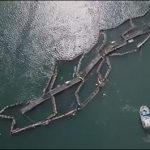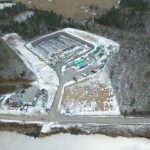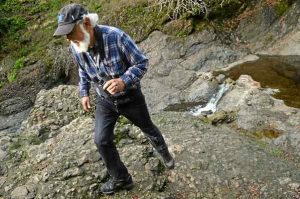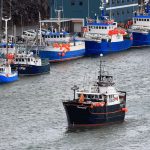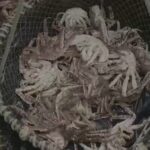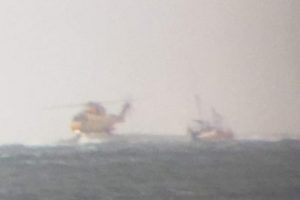Tag Archives: Fisheries New Zealand
Researcher urges caution on rock lobster catch limit increase
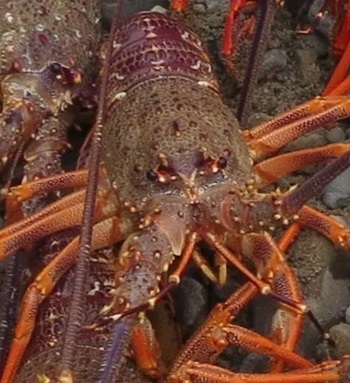 Seafood industry players say they will welcome an increase in catch limits for rock lobster and Pacific bluefin tuna if a proposal by the Oceans and Fisheries Minister gets the green light. However, a researcher is warning that increasing catch limits for rock lobsters is too risky. Oceans and Fisheries Minister Shane Jones has reviewed catch limits for spiny red rock lobster in the Hauraki Gulf, Coromandel and Bay of Plenty region, known as CRA 2, as well as Otago or CRA 7, and for Pacific bluefin tuna in TOR 1 (all of New Zealand). Consultation opened on Friday. The rock lobster fisheries were valuable for the economy and culturally, Jones said. “The fisheries provide jobs, bring significant export income for New Zealand, and are popular with recreational fishers. It’s important that we strike the right balance between getting the most value possible from these fisheries while ensuring their sustainability. This is reflected in the proposals.” more, >>CLICK TO READ<< 13:52
Seafood industry players say they will welcome an increase in catch limits for rock lobster and Pacific bluefin tuna if a proposal by the Oceans and Fisheries Minister gets the green light. However, a researcher is warning that increasing catch limits for rock lobsters is too risky. Oceans and Fisheries Minister Shane Jones has reviewed catch limits for spiny red rock lobster in the Hauraki Gulf, Coromandel and Bay of Plenty region, known as CRA 2, as well as Otago or CRA 7, and for Pacific bluefin tuna in TOR 1 (all of New Zealand). Consultation opened on Friday. The rock lobster fisheries were valuable for the economy and culturally, Jones said. “The fisheries provide jobs, bring significant export income for New Zealand, and are popular with recreational fishers. It’s important that we strike the right balance between getting the most value possible from these fisheries while ensuring their sustainability. This is reflected in the proposals.” more, >>CLICK TO READ<< 13:52
Blue cod numbers declining in southern waters
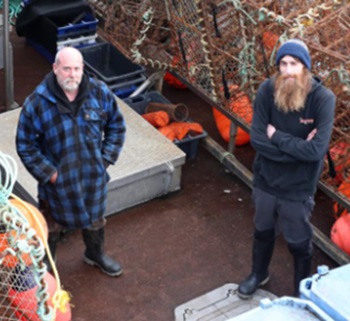 Declining numbers of blue cod in southern waters have prompted a review of catch limits for the 2024-25 year. A Fisheries New Zealand discussion paper says a survey of Foveaux Strait in 2023 concluded the abundance of blue cod in that area had declined by 57% since 2020 and the stock in Foveaux Strait was significantly overfished. “Catches of blue cod in [Southland and Sub-Antarctic area] have consistently declined for the last 20 years.” An average of 49 fishing vessels reported targeting blue cod annually over the last three years in the Southland and Sub-Antarctic waters. But poor catch rates had prompted the association representing those fishers and quota holders to ask for the fishery to be reviewed for the 2024-25 fishing year, starting October 1. more, >>CLICK TO READ<< 21:38
Declining numbers of blue cod in southern waters have prompted a review of catch limits for the 2024-25 year. A Fisheries New Zealand discussion paper says a survey of Foveaux Strait in 2023 concluded the abundance of blue cod in that area had declined by 57% since 2020 and the stock in Foveaux Strait was significantly overfished. “Catches of blue cod in [Southland and Sub-Antarctic area] have consistently declined for the last 20 years.” An average of 49 fishing vessels reported targeting blue cod annually over the last three years in the Southland and Sub-Antarctic waters. But poor catch rates had prompted the association representing those fishers and quota holders to ask for the fishery to be reviewed for the 2024-25 fishing year, starting October 1. more, >>CLICK TO READ<< 21:38
Fisheries New Zealand Seeks Feedback on Proposed Catch Limits for 2024
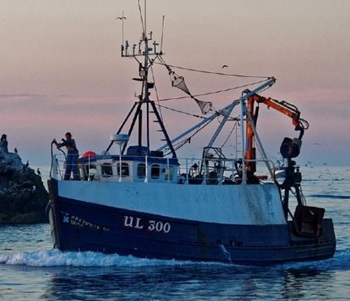 Fisheries New Zealand is asking for feedback on proposed changeson proposed changes to catch limits and other settings across a range of Aotearoa New Zealand’s fisheries as part of its twice-yearly sustainability review. Every six months, Fisheries New Zealand reviews a range of fish stocks and develops proposals focused on their long-term sustainability. “When the information suggests more fish can be harvested sustainably, we look to increase catch limits,” said Marianne Lukkien, acting director of fisheries management. “On the other hand, if the information suggests a stock isn’t as healthy, we propose reducing the catch limits or other changes to help the fishery recover.” In this review, options include increases to catch allowances for six fish stocks where information suggests more fish can be sustainably harvested. more, >>click to read<< 18:36
Fisheries New Zealand is asking for feedback on proposed changeson proposed changes to catch limits and other settings across a range of Aotearoa New Zealand’s fisheries as part of its twice-yearly sustainability review. Every six months, Fisheries New Zealand reviews a range of fish stocks and develops proposals focused on their long-term sustainability. “When the information suggests more fish can be harvested sustainably, we look to increase catch limits,” said Marianne Lukkien, acting director of fisheries management. “On the other hand, if the information suggests a stock isn’t as healthy, we propose reducing the catch limits or other changes to help the fishery recover.” In this review, options include increases to catch allowances for six fish stocks where information suggests more fish can be sustainably harvested. more, >>click to read<< 18:36
Grounded Austro Carina trawler at Banks Peninsula starting to break up, salvage could take months
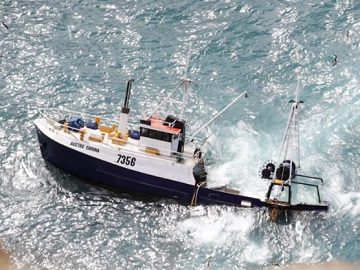 The fishing boat that ran aground at Banks Peninsula carrying thousands of litres of diesel is breaking up, Canterbury Regional Council says. Heavy swells continue to make it difficult for crews to get to the Austro Carina, which ran aground near a marine reserve at Shell Bay’s Red Bluff on 24 September. The boat was carrying about 10,000 litres of diesel and 400 litres of hydraulic oil. The council warned it could take months to salvage the wreck, with the necessary equipment unavailable in New Zealand. Wild weather that battered Banks Peninsula earlier this week ripped a hole in the boat. >>click to read<< 09:50
The fishing boat that ran aground at Banks Peninsula carrying thousands of litres of diesel is breaking up, Canterbury Regional Council says. Heavy swells continue to make it difficult for crews to get to the Austro Carina, which ran aground near a marine reserve at Shell Bay’s Red Bluff on 24 September. The boat was carrying about 10,000 litres of diesel and 400 litres of hydraulic oil. The council warned it could take months to salvage the wreck, with the necessary equipment unavailable in New Zealand. Wild weather that battered Banks Peninsula earlier this week ripped a hole in the boat. >>click to read<< 09:50
Shell Bay, Banks Peninsula oil spill: Plan to remove boat in the works
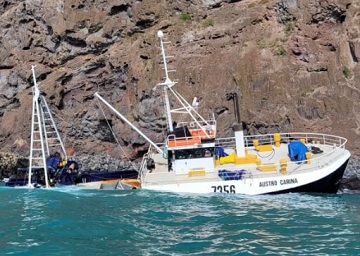 The 25m Austro Carina, owned and operated by Lyttelton-based Pegasus Fishing Ltd, ran aground near picturesque Shell Bay on the southeastern side of the Banks Peninsula on Sunday, September 24. The 140-150 tonne boat is currently still stuck with the gaping hole at the bottom of a 100-metre, potentially unstable cliff. The unfortunate position of the boat means it cannot be reached, according to the regional council, Environment Canterbury (ECan). “Access to the vessel by water has been heavily restricted by heavy seas, the rugged shoreline, and poor weather over the last week,” Emma Parr, Regional On-Scene Commander for the Harbourmaster’s Office, said. Photos, >>click to read<< 09:43
The 25m Austro Carina, owned and operated by Lyttelton-based Pegasus Fishing Ltd, ran aground near picturesque Shell Bay on the southeastern side of the Banks Peninsula on Sunday, September 24. The 140-150 tonne boat is currently still stuck with the gaping hole at the bottom of a 100-metre, potentially unstable cliff. The unfortunate position of the boat means it cannot be reached, according to the regional council, Environment Canterbury (ECan). “Access to the vessel by water has been heavily restricted by heavy seas, the rugged shoreline, and poor weather over the last week,” Emma Parr, Regional On-Scene Commander for the Harbourmaster’s Office, said. Photos, >>click to read<< 09:43
Owner of grounded trawler working on salvage plan
 The owner of a fuel-laden fishing trawler that is grounded off Banks Peninsula is working on a salvage plan for the stricken boat and has promised to help manage the environmental impact of any spills. Four crew members had to be winched to safety by helicopter when the 25m Austro Carina ran aground at Red Bluff near Shell Bay last Sunday night, carrying 10,000L of diesel and 400L of hydraulic oil. The boat’s owner Pegasus Fishing said it was working with authorities on the best approach to salvage the trawler. “We are happy to confirm media reports that all our crew are safe and well, although they are still understandably shaken from the events of Sunday night,” the statement said. >>click to read<< 08:07
The owner of a fuel-laden fishing trawler that is grounded off Banks Peninsula is working on a salvage plan for the stricken boat and has promised to help manage the environmental impact of any spills. Four crew members had to be winched to safety by helicopter when the 25m Austro Carina ran aground at Red Bluff near Shell Bay last Sunday night, carrying 10,000L of diesel and 400L of hydraulic oil. The boat’s owner Pegasus Fishing said it was working with authorities on the best approach to salvage the trawler. “We are happy to confirm media reports that all our crew are safe and well, although they are still understandably shaken from the events of Sunday night,” the statement said. >>click to read<< 08:07
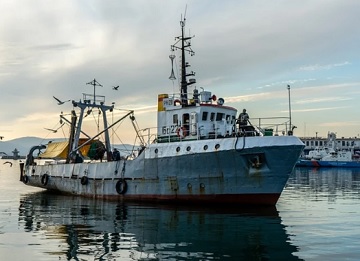
New Zealand: Rollout of camera monitoring on commercial fishing vessels confirmed
Up to 300 inshore fishing vessels will be fitted with the technology by the end of 2024, providing independent, accurate information about fishing activity and better evidence for decision-making,” Oceans and Fisheries Minister David Parker said. “It will be supported by cutting-edge artificial intelligence software that will help put New Zealand at the forefront of camera monitoring technology. The introduction of on-board cameras is a key component of the Government’s fisheries reforms. It follows the 2019 roll out of cameras on vessels operating in core Māui dolphin habitat, and builds on work initiated in 2017 by the then-Minister, Nathan Guy. >click to read< 10:25
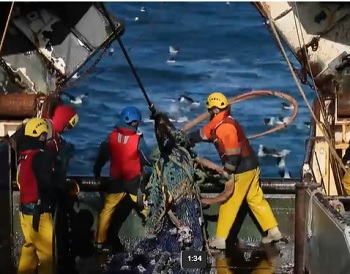
A day in the life of a hoki fishing trawler crew
Johnny Thompson was an accountant in Auckland until a snowboarding accident changed his life. “I had it real bad for a start – those first few days were the worst – eventually I came right but everyone takes different amounts of time to get over it.” Thompson is now part of the crew aboard Sealord’s wetfish trawler Otakou , which Stuff joined for a 15-hour expedition for hoki in the Cook Canyon. The day begins at Picton’s Waitohi Wharf at 9am with a five-hour steam to the fishing grounds at the south eastern end of Cook Strait. However, once the vessel hits the open sea it is literally all hands on deck for all 14 crew members. video, >click to read< 17:50
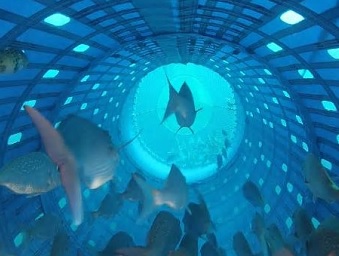
New Zealand: Regulatory approval of new innovative trawl technology
Fisheries New Zealand has approved the use of the Precision Seafood Harvesting (PSH) Modular Harvest System (MHS) in North Island inshore fisheries for snapper, tarakihi, trevally, red gurnard, and John dory with specific conditions. Stuart Anderson, Director Fisheries Management at Fisheries New Zealand, says innovation in the fishing industry is important to deliver sustainability benefits and is a key step in the journey to shift to higher value products. “In granting this approval Fisheries New Zealand is satisfied that this system performs at least as well as traditional mesh trawl nets, while ensuring sustainability benefits,” says Mr Anderson. >click to read<20:30

New Zealand approves innovative trawl technology
Fisheries New Zealand on Monday approved the use of an innovative trawl technology for commercial operations in some deep–water fisheries, called the Precision Seafood Harvesting Modular Harvest System (MHS). The MHS is the first innovative trawl technology to be approved under amendments to the commercial fishing regulations introduced last year, Stuart Anderson, director of fisheries management at Fisheries New Zealand, said in a statement. The regulations were amended to support innovations in trawl gear that provide opportunities to achieve better quality of catch, add value across the sector, and ensure the sustainable use of fisheries resources, Anderson said. >click to read<09:44

































